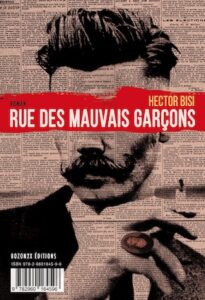Hector Bisi: Not just dandy
by Kim M. Hastings Writer and dandy Hector Bisi was born in Belém, in the Brazilian Amazon, and has donned several different hats since, working as an engineer, copywriter and modelling agent. He caused a bit of a stir some years ago with the publication of his debut novel Copacubana, which tells the tale of the owner of a decadent hotel who is addicted to young girls from Rio de Janeiro’s favelas, with all their imperfections (“humbies” he affectionately calls them). “Beautiful girls don’t interest me. In a city like Rio, someone has to value ugliness,” avers the main character. The work is provocative in its portrayal of poverty, prostitution and depravity as it delves into the seamy side of presumed paradise. In response to criticism of its controversial content, Hector explained at the time: “True literature can’t be politically correct or militant. My aim was to write a politically perverted book… about the hottest place south of Havana.”
Writer and dandy Hector Bisi was born in Belém, in the Brazilian Amazon, and has donned several different hats since, working as an engineer, copywriter and modelling agent. He caused a bit of a stir some years ago with the publication of his debut novel Copacubana, which tells the tale of the owner of a decadent hotel who is addicted to young girls from Rio de Janeiro’s favelas, with all their imperfections (“humbies” he affectionately calls them). “Beautiful girls don’t interest me. In a city like Rio, someone has to value ugliness,” avers the main character. The work is provocative in its portrayal of poverty, prostitution and depravity as it delves into the seamy side of presumed paradise. In response to criticism of its controversial content, Hector explained at the time: “True literature can’t be politically correct or militant. My aim was to write a politically perverted book… about the hottest place south of Havana.”
More recently, Hector has again been creating waves, as his latest work further challenges what we hold to be truths about beauty, morality and humanity. In the words of its first reader, Brazilian publisher and dandy Pedro Paulo de Sena Madureira, “Those who read and understand [this novel] will be shocked by the world we live in.”
The following chat was conducted virtually, in Portuguese.
Kim: Your new novel, Rue des mauvais garçons [Bad Boys Street], imagines a Paris in which two rival gangs of dandies, the Byrons and the Brummels, attempt to makeover the city, doing away with everything that fails to meet their moral and beauty standards: people with no sense of style, tacky tourists, couples who display affection in public… Vanity knows no bounds as a kind of fashion totalitarianism is imposed. What inspired your creation of this parallel reality?
Hector: Ever since my 20s I’ve been fascinated by The Picture of Dorian Gray, its world of dandies, Bohemian oiseaux de nuit. I lived in London in the early 90s and the impact of that –imagine going from Belém in the Amazon straight to the buzz of London – well, I developed my aesthetic sense, discovered overcoats (I hadn’t ever worn one – the Amazon heat never lets up), and began my second life, which later took me to Paris and the realisation that elegance – in everything, not just clothing – is a kind of seventh sense.
My bad boys were born out of this obsession with la grande bellezza and from an epiphany: I was strolling along the Île Saint-Louis a few years ago and saw a couple kissing; the two were sitting on the low wall along the Pont de la Tournelle, their backs to the world. I thought: a Parisian who couldn’t stand tourists anymore might readily push the two into the Seine. I wrote up the scene in my Moleskine, thought a gang of anarcho-dandies would be perfect for the role, and began to deconstruct the Paris of love’s love and the Instagrammer narcissism of our times. Revisiting Guy Debord, we’re living in the society of the personal spectacle.
 Tell me more about your relationship with Paris. It certainly comes across as a love-hate thing as portrayed in the novel.
Tell me more about your relationship with Paris. It certainly comes across as a love-hate thing as portrayed in the novel.
Paris only exists for those who understand that it’s unreal. I’ve been going for more than twenty years but the relationship changed when my first novel came out. It’s that thing about the right to a city that Cortázar (one of my favorite authors) talked about. I feel Paris accepted me once I became a writer. You know, artists can create anywhere but should, must, die in Paris. Especially if they never lived there. I mean, die in Paris to live in Paris, your work in the air in the company of Prousts, Flauberts, Baudelaires, Hemingways, Picassos, Dalís, Truffauts. Of course, there are things like… one Sunday afternoon I was taking pictures of my wife (she was in a swimsuit and boots) on the balcony of the Moderne, the Latin Quarter hotel where I’ve stayed in the same room for years, when the concierge knocked on the door. Embarrassed, he told me a neighbour from across the Rue des Écoles had come to the lobby to complain about this pornographic act, saying that her husband was home, haha, ça c’est trop Parisien. As for Bad Boys, the xenophobia, the hatred of tourists, the extreme vanity… those are also in the Paris air. You know, a French publisher who rejected my novel sent an email to my agent saying it was hard to believe the book had been written by a Brazilian. Well, to disappear as an author… it was the best rejection I’ve ever had. Vive la fête.
Leonard Cohen and Morrissey are, in my mind, great writers. ‘If a double-decker bus crashes into us, to die by your side is such a heavenly way to die.’ That’s Rimbaud reloaded, a rocker poem. And it’s sooo romantic.”
There’s a breathless, unfettered quality to your text – which purports to be Paris, even as you’re deconstructing it: paragraph-long sentences with little or no punctuation, blurring of narrative and dialogue, blending of languages and cultural references. Can you comment on this particular choice of writing style and its intended effects?
I think I write to compensate for the fact that I’ve never had a band. I used to play a bit of saxophone but gave it up, so I went on to play with words. Text like a guitar riff, fast-paced, making people wonder: wtf is this? – that’s what I try to do. I hate clichés, metaphors, I’d never write in a “he said, she said” format, I mix untagged dialogue with narrative, I like to blend languages like Portuguese, English, French, and Italian lately too. Can it be confusing? Life is such a wonderful confusion.1
Leonard Cohen and Morrissey are, in my mind, great writers. “If a double-decker bus crashes into us, to die by your side is such a heavenly way to die.” That’s Rimbaud reloaded, a rocker poem. And it’s sooo romantic… You see, we can be romantic in a different way, I mean, sugar-free. Claire Blach and Raphaël Denys, my Belgian publishers, say that Bad Boys Street is a literary UFO. Wow, the way Brazil is being destroyed by the current government, I have to think about some planet to go into self-exile.
You say you don’t write fictions but rather infections. What do you mean by this, especially in a time of heightened awareness – and fear – of contagion?
Unfortunately, besides the tragedy of Covid, we see the virus of denialism being spread by unscrupulous neofascist leaders. In a certain South American country, a real genocide is taking place, an insane parallel reality.
In my opinion, religions bring spiritual comfort to people, but in large part they only say what one wants to hear. With good literature, it’s the opposite. The great nineteenth-century Russian writers got that. I seek out stories with unexpected themes, I don’t much explore intimate relationships the way psychological novels do. Maybe Bad Boys Street is a bit eccentric – not everyone is interested in fashion, dandies. And that’s where contagion has to happen: the writer has to take the reader’s hand and lead them into the story via the style, the form. Whether the story is true or not doesn’t matter. By the way, I’m writing a new infection now, titled Life Could Be an Endless Weekend. It’s going to be full of amour fou and voyeurism.
Let’s talk further about points of contact between Bad Boys Street and what we’ve lived through this past year. How have the extreme events of 2020 – the pandemic, right-wing radicalism, unprovoked and unruly violence, blatant truth distortion – reshaped or recontextualised how we might interpret the novel?
The world isn’t good but it’s the planet we have for now. I started to write the novel years before this extreme-right wave and, well, the totalitarianism in the book became more and more current. There’s so much absurdity going on that someone being beaten or killed for the way they dress, for wearing Crocs, becomes factual. There’s a passage where a family is attacked for wearing jeans – the blue virus, as the dandies call it. It’s another context but the plague is there. Does art anticipate life? When you write, you feel the world, the zeitgeist, even if the story takes place in a lost city in the Amazon. Toward the end of Bad Boys, I describe a fashion show where a model falls off a firetruck onto the runway and dies; she’s left lying there while the show goes on. In April 2019, the novel already written and a few months before it came out in France and Belgium, a model died during a São Paulo Fashion Week show and the event proceeded uninterrupted. I was in Rio de Janeiro at the time, I’ll never forget my shock reading the news.
Do you think fashion, as a tool of transformation, can be used for the betterment of society?
Moda, the Portuguese word for fashion, comes from modus, behaviour. I think that elegance can bring about this transformation. I mean, elegance isn’t just the clothing we wear; it’s courtesy, caring about others, having a social conscience.
The luxury industry moves billions and has become more inclusive (I don’t know to what extent the change was spontaneous), stimulating diversity and contracting Black models for its campaigns, which was rare a decade ago. It’s still not much. In an unequal country like Brazil, it’s hard to talk about luxury. Yes, fashion sells dreams, but a handbag costing the same as a common car?
I’m not going to be a hypocrite, I like to wear João Pimenta (a Brazilian creative designer) and Comme des Garçons. Above all, cool is creating your own style. That’s timeless and doesn’t have to do with money. There’s nothing tackier than fashion victims.
I’ve enjoyed our conversation, Hector – eye-opening indeed. Anything else you’d like to share?
Many thanks, so have I. May 2021 be more elegant with all of us.
1 The author agreed to italicise dialogue in the accompanying excerpt for Bookanista. This treatment does not appear in the original French edition. The novel has not yet been published in Brazil.
 Hector Bisi was born in Belém, in the Brazilian Amazon. His first novel, Copacubana (2011), was published in Brazil and Argentina. His second, titled Rua dos Garotos Maus in Portuguese, was published in France and Belgium by Bozon2X in 2019 as Rue des mauvais garçons, translated by Stéphane Chao. Hector’s short stories and excerpts from his novels can be found on the sites La Cause Littéraire (France), El Malpensante (Colombia), and São Paulo Review (Brazil). A former contributor to L’Officiel Hommes Brasil, he has also participated in literary events at the Sorbonne. Hector currently lives between São Paulo and Paris.
Hector Bisi was born in Belém, in the Brazilian Amazon. His first novel, Copacubana (2011), was published in Brazil and Argentina. His second, titled Rua dos Garotos Maus in Portuguese, was published in France and Belgium by Bozon2X in 2019 as Rue des mauvais garçons, translated by Stéphane Chao. Hector’s short stories and excerpts from his novels can be found on the sites La Cause Littéraire (France), El Malpensante (Colombia), and São Paulo Review (Brazil). A former contributor to L’Officiel Hommes Brasil, he has also participated in literary events at the Sorbonne. Hector currently lives between São Paulo and Paris.
bozon2x.be
hectorbisi
 Kim M. Hastings is a freelance translator and editor based in the US. She lived in São Paulo for several years, studied Brazilian language and literature at Brown University, and holds a PhD in Spanish and Portuguese from Yale. Her translations include Edgard Telles Ribeiro’s award-winning novel His Own Man (O punho e a renda) and short fiction and author interviews published in anthologies and magazines including The Book of Rio, Words Without Borders, Review: Literature and Arts of the Americas, Two Lines, Litro, Machado de Assis and Bookanista.
Kim M. Hastings is a freelance translator and editor based in the US. She lived in São Paulo for several years, studied Brazilian language and literature at Brown University, and holds a PhD in Spanish and Portuguese from Yale. Her translations include Edgard Telles Ribeiro’s award-winning novel His Own Man (O punho e a renda) and short fiction and author interviews published in anthologies and magazines including The Book of Rio, Words Without Borders, Review: Literature and Arts of the Americas, Two Lines, Litro, Machado de Assis and Bookanista.
Read more

